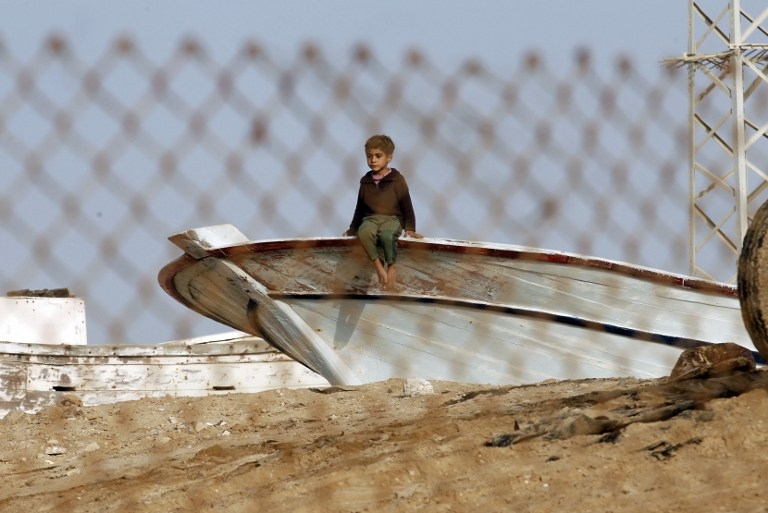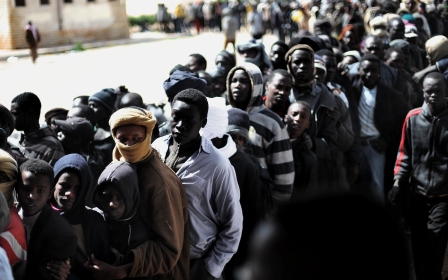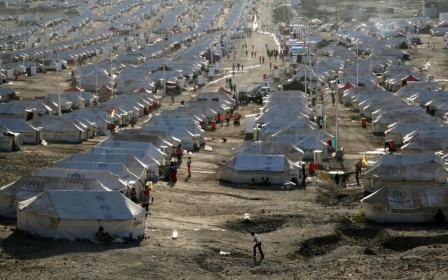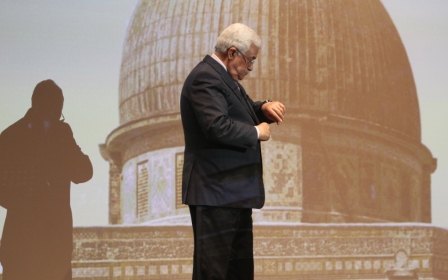Palestinians lose Egypt residency for Mediterranean crossing attempt

Three generations of the Palestinian diaspora once lived in this modest family home on the outskirts of Alexandria.
In the front room, Abu Ismail, the father and a 1948 refugee who came to Egypt from Gaza in 1967, has been narrating a history of betrayals and border-crossings for a few minutes now. Umm Ismail, a former resident of Syria’s Yarmouk camp who left in the 1970s, is brewing a pot of spiced tea in the kitchen next-door.
But their sons, Ismail and Hassan, are no longer here. The two brothers now form the latest chapter in a family history which has already witnessed multiple displacements, civil wars in assumed homelands. Sons of the Nakba (Catastrophe) in 1948 and 1967 refugees, nephews of Palestinian “fedayeen” (fighters) from the Lebanese Civil War, the brothers' story also highlights the Palestinian experience in Egypt from history to the present day.
In September, Ismail and Hassan were trying to leave Egypt's north coast when the smuggling boat they were on was caught, dawdling off the coast, by the authorities in Alexandria. The brothers were moved from police station to prison and back; stripped of their residency and, in mid-December, deported to Malaysia after more than two months in detention.
“I’d always wanted to leave Egypt, but leaving this way made me sad,” said Ismail, speaking by telephone from Malaysia. He remembered feeling “nothing” until the moment he was put on a plane, Cairo to Quala Lumpur, and then he felt “absolutely everything.”
“If I’d reached Europe, things could have been different,” the 35-year-old added ruefully.
Back in Egypt the brothers’ mother and father are still coming to grips with the deportation.
“We still don’t know why it happened,” said their mother, who asked to be named as Umm Ismail. “We want to see their file or know what charges they were facing.”
They ask for answers, before Abu Ismail chides his wife.
“Why are you going over this again?” he said to his wife after pausing to listen.
Singled out
Their story says a lot about how refugees attempting to reach Europe by boat are treated in Egypt when they are caught. Around 4,500 people were detained on the north coast in 2014; while over 250 Palestinians, including those who crossed illegally through Gazan tunnels and others with family residing legally in Egypt, were deported to Gaza, according to figures supplied by the Egyptian Initiative for Personal Rights researchers in Alexandria.
It also speaks volumes about life for the estimated 70,000 Palestinians residing in Egypt.
“I lived my whole life in Egypt,” Ismail said from Anfoushy Youth Centre, a temporary detention facility in Alexandria, in late October before he was deproted. "They renew my Palestinian [residency permit] every three years." Unlike Palestinians from Syria in detention at the same time, the minister of interior's office itself reportedly signed off on the brothers' deportation to leave Egypt in October - a process routinely controlled by state security.
"They came to us and said: 'Buy a ticket. Go anywhere.' But where are we supposed to go?" Ismail asked.
Refugees who either cannot afford to pay for a flight from Egypt, or refuse deportation procedures, may be transferred to prison.
After over a month in detention, on 28 October, the brothers were driven to the Rafah crossing bordering Gaza, where they were refused entry due to security conditions and then taken to Ismailia’s El-Mustaqbal Prison, close to the Suez Canal. The commanding officer at the prison rejected them, according to lawyers from the Egyptian Centre for Economic and Social Rights in Alexandria, and the brothers were then returned again to the city that was once their home.
"I don’t know why the Egyptian authorities deal with us like this," said Umm Ismail. "Maybe because my sons tried to migrate illegally, but then on the other hand people from Sudan, Afghanistan or Turkey are allowed to go anywhere from Egypt - but for us, no, because we might be from Gaza?”
Umm Ismail later recalled the visits to Muntazah Second Police Station after one attempted deportation; waiting for another.
“They were the worst days…I hope nobody has to go through that.” Umm Ismail claimed bribes had to be paid to police officers in order to visit their sons, who were detained just 20 minutes’ drive from the family home. “We had to pay a lot of money to see them.” Sometimes ‘seeing them’ meant communicating through a hatch in the cell door,” she added.
Like any refugee population in a host country, Palestinians often find themselves prey to changing domestic or international politics. Refugees of many nationalities are also deported, more often to origin countries, when caught trying to cross the Mediterranean irregularly. But in Egypt, the strained geo-political relationship with its neighbour has clearly left many Palestinians, like Umm Ismail, feeling singled out.
“We’re worried sometimes that because we’re Palestinian, someone might say we’ve done something wrong and tell the authorities,” she said.
"We haven’t even told our neighbours that [Ismail and Hassan] were deported. We tell them it was our sons’ decision, because we don’t want any problems with anyone.”
Tarnished as terrorists
Since the 3 July 2013 overthrow of then Egyptian president Mohammed Morsi, Palestinians have faced difficult circumstances in Egypt - whether incitement in the media, a striking turn against Gaza during this summer’s war, or the extended closure of the Rafah crossing, the only border in the Gaza Strip that Israel does not control.
Similarly, after a string of events including the 1978 assassination of Egyptian writer and official Youssef El-Sebai in Cyprus by Palestinian gunmen purportedly aligned to the Palestine Liberation Organisation, President Anwar Sadat's government revoked many of the citizenship rights granted to Palestinian refugees by his leftist predecessor, Gamal Abdel Nasser.
From the Second Intifada to Operation Protective Edge, the history of Palestinians in Egypt is defined by these unstable peaks and troughs.
Wesam al-Rayes from the Palestinian Women's Union, one of several Palestinian organisations based in Cairo, illustrates this when she talks, drawing an imaginary graph-line up and down in the air. And yet Rayes claims this is now the worst time for Palestinians in Egypt, including the Sebai assassination in 1978.
"This is really the first time Palestinians are facing an aggressive reaction from the authorities in Egypt," Rayes said in her downtown office.
"There were never security problems like this in Egypt before, so [the authorities] are very sensitive. They are looking at Palestinians as a party that will create troubles for them," she added. "I don't know if this will be a policy in Egypt that they will continue for good, or it will finish once the political situation becomes more stable.”
Recent security measures have included revoking residency permits for Palestinians. Assistant Interior Minister for Immigration and Nationality, Hussein El-Reedy, recently outlined how a Palestinian's residency could be revoked in an interview with the website of state-run newspaper, Al-Ahram.
"The Cabinet can revoke nationality from [a Palestinian] if they joined a foreign organisation overseas," he explained, "[or] if it was their purpose to undermine the social and economic system of the country by force or any illegal means."
Among those reportedly targeted was Mahmoud al-Zahar, former foreign minister in the Gaza Strip and a leading member of Hamas.
“If it is proved some were involved in terrorist acts," Reedy explained, "we will withdraw [citizenship] immediately."
The Interior Ministry has marketed the policy as a way of righting moves taken by Morsi, implying that under his rule, many Palestinians with suspicious or undefined affiliations were given the right to live in Egypt.
The Interior Ministry did not respond to requests for comment.
Rather than being tarnished as terrorists, it appears that Ismail and Hassan were punished for trying to immigrate illegally - and deemed "dangerous to national security" in the process, explained Yasser Salman, media officer at the Palestinian Consulate in Alexandria.
"[Ismail and Hassan] were trying to immigrate to another country illegally with a group of people when they were arrested," he said. "Deporting the brothers is a result of [them] breaking Egyptian laws and rules.”
No official policy
This is a position defended by Egypt’s Foreign Ministry.
“This is illegal,” said ministry spokesman, Badr Abdel Aaty. “It’s not permitted at all, for Egyptians or non-Egyptians to migrate illegally.”
However, Abdel Aaty denied the government maintains a policy of deportation for those, like Ismail and Hassan, caught on the coast.
“We don’t have any official policy to deport any refugee, however they entered or left the country…It’s not our policy. But,” he added, “if they enter illegally or leave illegally, everyone must be dealt according to the Egyptian law.”
In the end, Abu and Umm Ismail gathered together the money to get Ismail and Hassan to Malaysia.
They are safe there, but not necessarily secure. Hassan, 19, is working in a restaurant while Ismail tries to find the money to pay for their rent and residency documents.
“We’re trying to go somewhere else,” he said. “I don’t want to go to prison again.”
In the meantime, they must fashion a home out of the diaspora, thousands of miles from their family home in Egypt.
Full names withheld to protect identities.
Mahmoud El-Sobky and Ahmed Hassan Aly contributed to reporting.
New MEE newsletter: Jerusalem Dispatch
Sign up to get the latest insights and analysis on Israel-Palestine, alongside Turkey Unpacked and other MEE newsletters
Middle East Eye delivers independent and unrivalled coverage and analysis of the Middle East, North Africa and beyond. To learn more about republishing this content and the associated fees, please fill out this form. More about MEE can be found here.




